In comparison to some other sports, tennis fans may appear to be downright spoiled at first glance. Just last year, we had two follow-ups in Tennis World Tour 2 and AO Tennis 2 that were able to build on their existing foundations in their attempt to re-create all of the back-and-forth action and suspense of playing on center court in a major tournament. However, Full Ace Tennis Simulator has also been rallying in the background.
So the obvious question is, which tennis game is actually the best out there right now?
If you can dig deeper than those aforementioned titles, there are many who will tell you that the greatest tennis game has already been around for quite some time. 2011’s Top Spin 4 is still considered a gold standard by a good portion of the community, while others brand Tennis Elbow 2013 as the crown jewel of tennis gaming (Tennis Elbow 4 is slated to be released this June). I’ll personally always have a soft spot for Super Tennis on the Super Nintendo all the way back in 1991, but that’s probably just nostalgia talking more than anything else.
Full Ace Tennis Simulator certainly comes up when talking about the best tennis game currently on the market. Though it initially was released for PC in 2018 by developer Galactic Gaming Guild, the game has received quite a few updates since then to refine some of its core gameplay mechanics and add more details based on community feedback. Having not played the game until now, I thought I would check out how Full Ace Tennis Simulator is stacking up to the competition and whether it’s worthy of consideration for best tennis simulation available at the moment.
(Before getting to the review, I have to say I have a minor quibble with its unfortunate title. I’ve heard of aces before, of course, but I really could not tell you what a “full” ace is and what distinguishes one from other aces. Also, the use of “simulator” in the title almost makes it seem as if this could be easily confused for a first-person VR title and that you might be required to swing your arms around some to “simulate” the act of playing tennis.)
What I Like – Full Ace Tennis Simulator Review
Tutorial
A good tutorial is always appreciated by me because I want to start off as a ball of clay ready to be taught how to mold myself into a champion. Full Ace Tennis Simulator has you covered as far as that goes by not only explaining how each shot type works and how to perform each one, but it also gives you the opportunity to try each one out to ensure you know to do the shots correctly. There’s even a handy menu that allows you to access each of the tutorial lessons separately should you happen to be struggling with a particular aspect of your game.
A practice mode functions as something of a companion to the tutorial. Here you’re free to work on any or all of your ground strokes by returning balls being shot out of a machine at various speeds. You can also specifically work on your serve and on overhead smashes, but it would be appreciated if you could also focus on returning serves because that can be one of the more difficult aspects of the game, especially on higher difficulty levels.
Fundamentals
The basics of hitting a ball in Full Ace aren’t really all that different from other tennis games on the market, which shouldn’t come as too much of a surprise considering how positioning and timing are always going to generally be the biggest considerations — and that’s quite true even in real tennis. The one big difference here is that you are required to decide whether you want to hit a ball forehand or backhand (by using the bumpers on the controller) before you choose what type of shot you want to hit.
There is an adjustment period with this where you can easily find yourself looking pretty ridiculous when you push the wrong button to try to hit a ball forehand when you should be facing backhand and end up swinging at empty air. At the same time, this does cut out the issue that can happen in other tennis games where the game automatically locks you into an animation that has you facing the wrong way when trying to hit. The good thing here with Full Ace is that you have no one to blame but yourself if you try to hit the ball from the wrong orientation.
The shots themselves are also similar to ones in other games, arming you with a full arsenal of strong shots, top spins, slices, lobs, and drop shots. When playing at the net, volleys function a little differently in that you aren’t required to select forehand or backhand before making your shot. This is appreciated since it would be nearly impossible while so close to your opponent to have to choose forehand or backhand before the ball is in your face. It does seem like the developers have compensated by making control a bigger issue with volleys, and it might actually be a little too difficult the way it’s been implemented now (I’ve always been more of a baseline player myself so this might affect others more). There is talk of an upcoming update to net play, so it will be interesting to see what kind of alterations the developers make to improve this key part of tennis.
Making a good shot is never going to be possible though unless you’re in a good spot to hit the ball. This means you need to be set up properly and not lunging awkwardly, and Full Ace admirably translates that importance by having your shots be less accurate when you’re not in good position. At the extreme end of this, you’ll find your shots not even powerful enough to get to the net — or else rocketing well out on the other side of the court in cases where you’re in a bad spot and struggle to even put a racket on the ball.
The other mitigating factor in making good shots is timing, and Full Ace utilizes a familiar system that has you holding a shot button to add the required amount of power and accuracy. Hold it for too long and that added power will have your shot be wild and possibly long, while if you don’t hold a button long enough you run the risk of your shot not making it over the net. It’s hardly re-inventing the wheel, but one interesting wrinkle here is that you can also push your shot button after you’ve first held it to add just another dose of power. It’s something that takes some practice and can be risky to even try, so it’s best to use it when you know you’re in good position and want to try to put a point away.
Service
The service mechanic in Full Ace Tennis Simulator is one of the better features, and it’s hard to think of another tennis game that has handled the relation between power and accuracy on a serve better. The secret weapon is the bar that initially appears when you push down a button to serve. If you merely tap the button to hit a serve with little power, you will see a bar that is almost entirely green. This means that no matter where you stop the line that will begin to rapidly move within the bar, it will still be easy to make your serve accurate. This is especially useful on second serves where you are really looking to prioritize accuracy over power so as to avoid a double fault.
But on those first serves where you can afford to throw caution to the wind and hunt for an ace, you’ll want to hold down the button a little longer when serving. By doing this, you’ll add power but you’ll also gradually start to see some yellow and then red spots appear on that bar, which will make it harder for your serve to be accurate when trying to stop that moving line in the right spot along the bar. It’s a fun little mini-game, and the way the bar shifts and contorts its colors the longer the button is pressed really does convey the way that adding even just a tad more strength on a serve will sacrifice some accuracy. There does seem to be at least a little RNG and factoring in of attributes as well because sometimes it feels like you’ll hit a serve with the exact same strength and spot on the bar and yet you’ll get different results.
Difficulty Levels
It’s always nice when you can start on the lowest difficulty level in a game and then begin to ascend to higher difficulties after what feels like a challenge at first gradually becomes too easy. This is exactly the experience I had with Full Ace. The learning and honing of techniques through repetition developed into consistency, and it wasn’t long before only the hardest difficulty level of “real-life” presented any sort of legitimate challenge.
Luckily, the challenge it does present is rather formidable, and it takes a considerable amount of time and practice to be able to compete against elite AI opponents at that level when the margins for error on all shots become mighty slim — and that’s as it should be really. It’s preferable to have a game that will take time to master rather than one that quickly becomes tedious to play once you’ve grasped how to exploit the CPU.
Challenges To Complete
They aren’t a huge feature here or anything, but it’s appreciated that the developers have included a number of challenges that you can play that will have you jump into scenarios in the middle of matches to try to achieve a victory. With varying degrees of difficulty, it’s enjoyable to try and overcome the obstacles they’ve set up for you that may require you, in many cases, to mount some impressive comebacks in order to succeed.
What I Don’t Like – Full Ace Tennis Simulator Review
Online
Simply put, it’s really hard to find a match online. Like, nearly impossible. This is obviously largely due to the fact that the community just isn’t all that large for a smaller game like this, but that simple explanation doesn’t make it any less disappointing. Of course, there are ways to find matches for those willing to dig a little bit and, to be fair, the game does prominently advertise on its launch screen a link to a Discord channel that will connect you directly to a modest and moderately active community playing the game. From there, you can regularly (but still not always reliably) find people looking to play a casual match or, should you feel ready enough to delve further into the competitive realm of the game, even discover links to sites that are hosting upcoming tournaments you can enter to see how you stack up against the rest of the world.
Presentation & Player Models
Since way back when I first remember seeing it done in Rogers Clemens’ MVP Baseball, I have to admit that I’ve always kind of enjoyed when games can get around not having the licenses for real players by instead having characters in the game that possess names and likenesses strikingly similar to the real athletes. That’s the route that Full Ace has been forced to go, and while it’s very obvious that Frederic Rougier is Roger Federer by the name and the fact that he’s the best player in the game, it still can’t help but be a little disheartening to not have his real name and image involved in any way.
The graphics of the players and environments are hardly eye-popping, but they are still detailed and immersive enough to compete respectfully alongside the other tennis games on the market. Similarly, the animations are mostly fluid and without glaring issues except for the way some balls can be hit despite the fact that it really looks as if the ball should have already bounced a second time by the time the racket got to it. The sounds of a match could really use an upgrade as well. The generic grunts emitted by players grates on the nerves before too long and there is little to be found in the way of realistic crowd atmosphere.
Career Mode
If you’re looking to assume control over a player over the course of a season, that’s entirely possible in Full Ace, but you’ll likely be disappointed by how bare-bones the mode is, especially when compared to other tennis games on the market. You’ll qualify for and play in tournaments that will see you ascend (or descend) in the season rankings depending on how you perform in each of them, but there’s really not much more to it than that.
You’re able to choose from any of the (sort of) real players that already exist or you can create your own player, but this works a little differently than career modes in other sports games. There are the usual options for customization as far as things like head, hair, equipment, and even movements, although these may not be quite as robust or polished by comparison. However, the big discrepancy is that you can actually set the values of your own attributes, allowing you the freedom to make your player as good or as bad as you would like.
There isn’t any of the kind of detailed progression where you gain attributes or rewards following matches or tournaments either. Evidently, you will improve some throughout your career should you create a player who is relatively young, but I have not spent enough time with the career mode yet to see exactly how this plays out over a long period of time.
Bottom Line
Full Ace Tennis Simulator definitely deserves to be in the conversation for the best tennis game you can currently play by excelling in the most important metric of all: being quite fun to play. When you get right down to it, none of the other bells and whistles matter all that much if a match doesn’t have any excitement or difficulty, and Full Ace offers plenty of both. It may be lacking in some features elsewhere, but on the court Full Ace Tennis Simulator brings to life all of the strategy and intuition that are required to succeed in tennis.



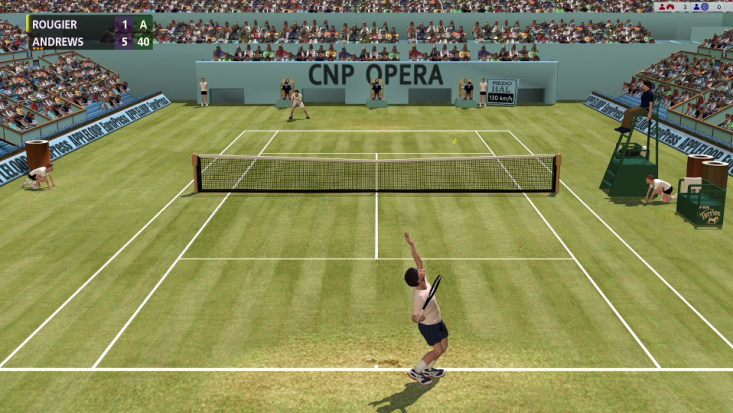
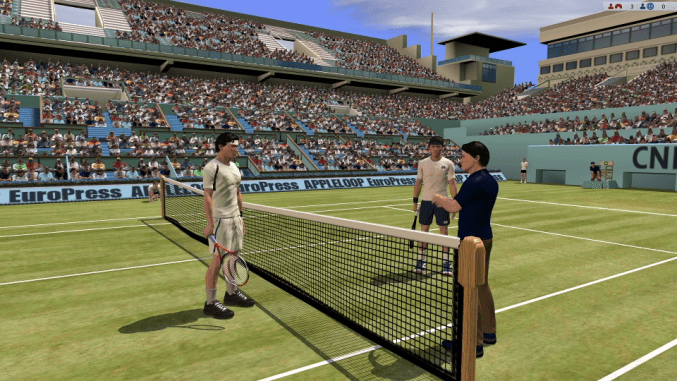
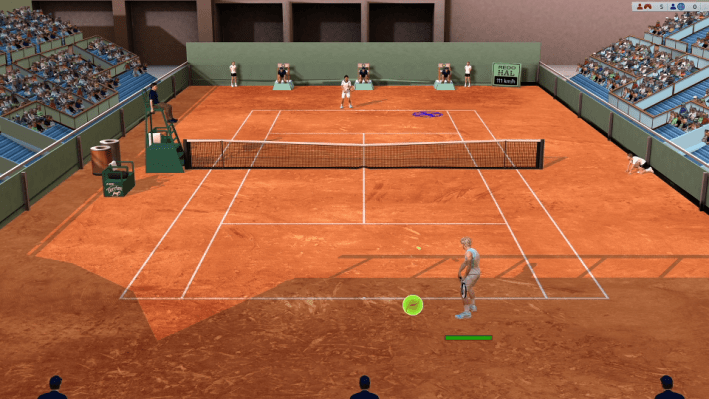
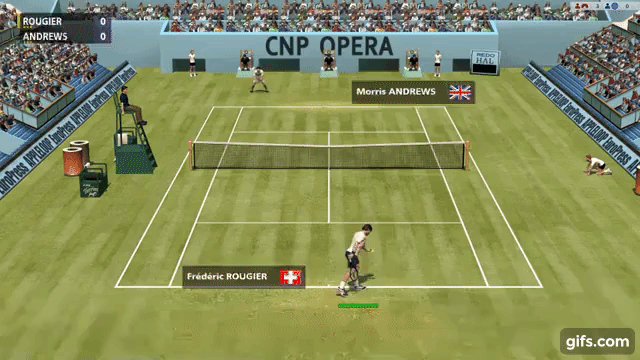
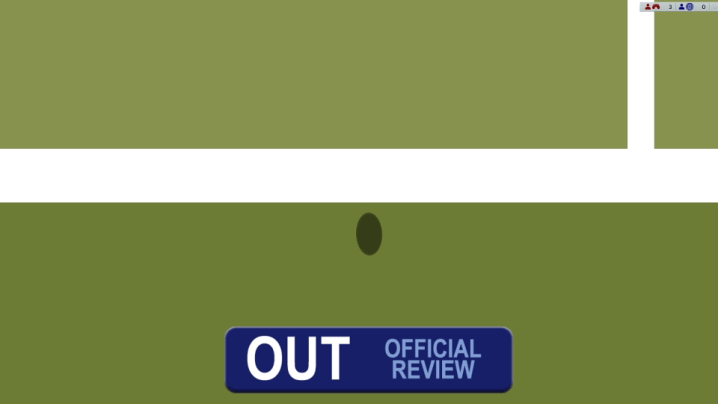
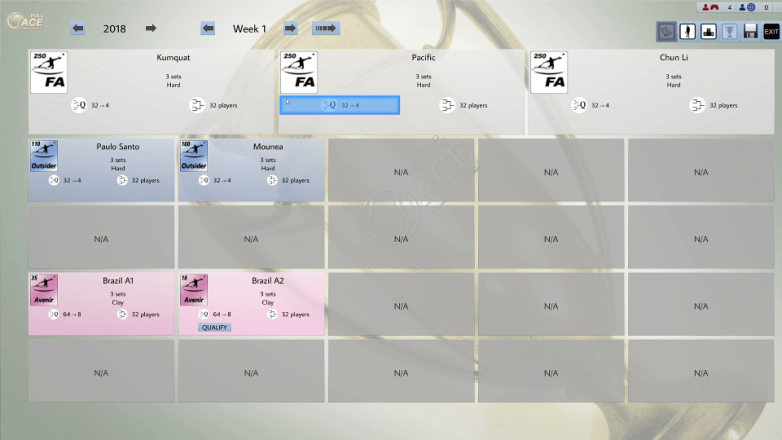





Published: Mar 8, 2021 01:35 pm